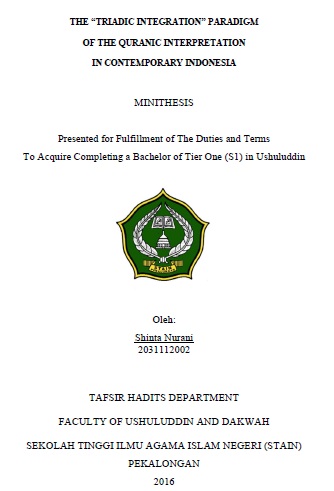
SKRIPSI IAT
The "Triadic Integration" Paradigm Of The Quranic Interpretation In Contemporary Indonesia
The problem of understanding and interpreting the Quran, one of the forms is always to try using it in contemporary life by giving the Qur’anic interpretation in accordance with the condition of the local community, international development, and Islamic values.
This research discuss about why the interpreters use the triadic integration paradigm and how the triadic integration paradigm implementation in the Quranic interpretation in contemporary Indonesia. The purpose of this paper is to know the aim of the interpreters use the triadic integration paradigm and to descript the triadic integration paradigm implementation in the Quranic interpretation in contemporary Indonesia. The study of the Qur’anic interpretation in Indonesia should be able to integrate the Islamic paradigm, Indonesian context, and good science in the context of social, economic, political, cultural, and religious aspects. In the integration process, it is expected to provide a vision of Islamic transcendental morality, while Indonesia is a scene and frame operations, and science is an instrument and a methodology to solve the problem directly in the field. In this stage then Islam would be more grounded in a dynamic society life.
The type of research is library research and qualitative research by using hermeneutical approach proposed by Hans Georg Gadamer. The primary data are the works of Indonesian Quranic interpretation on a range of years 2000 until 2013, as Tafsir Maudlu’i: Solusi Qur’ani atas Masalah Sosial Kontemporer (2001) by Prof. Nasruddin Baidan, Tafsir Kebahagiaan: Pesan Al-Qur’an Menyikapi Kesulitan Hidup (2010) by Jalaluddin Rahmat, Pribumisasi al-Qur’an: Tafsir Berwawasan Keindonesiaan (2012) by M. Nur Kholis Setiawan, and Wawasan al-Qur’an Tafsir Tematik Belbagai Persoalan Umat (2013) by M. Quraish Shihab. Then, the data collection techniques is used the method of documentation and the analysis of the data by descriptive analysis.
The result of this research are the interpreters use the triadic integration paradigm in the Qur’anic interpretation in contemporary Indonesia based on intrinsic and extrinsic factors. Intrinsic factors are a lot of people who just stop in awe and charm when reading the Qur’an without understanding the ideal moral from the Qur’an so the contemporary interpreters need variety method to uncover all the ideal moral of the Qur’an. Extrinsic factors are: First, locality that means Islam are not present in the empty space with the understanding of Islam because there are dialectical relationship between text of the Qur’an and cultural reality. Second, nationality that means always trying providing appropriate of the
viii
Qur’anic interpretation with the situation and local condition. Third, international that means science and technology as the point in the global world so relation and integration between religion and science technology are necessary to match the needs of contemporary society. The triadic integration paradigm implemented in the Qur’anic interpretation in contemporary Indonesia with several ways. First, the approach and model is contextual approach with use the triadic integration paradigm linkages between Islam, Indonesia, and science. Second, the form of the Qur’anic interpretation use nuanced of hermeneutics with epistemological-methodological interpretation. Third, type of the stage that means a mode used by interpreters to develop a network of his Qur’anic interpretation. An interpreter who has strongest stage that useful an interpreter and his Qur’anic interpretation of acceptability.
Ketersediaan
| 18SK1831008.00 | SK IAT 18.008 NUR t | My Library (Lantai 3, Ruang Skripsi dan Tesis) | Tersedia |
Informasi Detail
- Judul Seri
-
-
- No. Panggil
-
SK IAT 18.008 NUR t
- Penerbit
- Pekalongan : Jurusan S-1 Ilmu Al Quran dan Ilmu Tafsir FUAD IAIN Pekalongan., 2016
- Deskripsi Fisik
-
xvii, 273 hlm., 29 cm., Bibliografi : 262-273
- Bahasa
-
Indonesia
- ISBN/ISSN
-
-
- Klasifikasi
-
2X1.3009598
- Tipe Isi
-
-
- Tipe Media
-
-
- Tipe Pembawa
-
-
- Edisi
-
-
- Subjek
- Info Detail Spesifik
-
-
- Pernyataan Tanggungjawab
-
Shinta Nurani (2031112002)
Versi lain/terkait
Tidak tersedia versi lain
Lampiran Berkas
Komentar
Anda harus login sebelum memberikan komentar
 Karya Umum
Karya Umum  Filsafat
Filsafat  Agama
Agama  Ilmu-ilmu Sosial
Ilmu-ilmu Sosial  Bahasa
Bahasa  Ilmu-ilmu Murni
Ilmu-ilmu Murni  Ilmu-ilmu Terapan
Ilmu-ilmu Terapan  Kesenian, Hiburan, dan Olahraga
Kesenian, Hiburan, dan Olahraga  Kesusastraan
Kesusastraan  Geografi dan Sejarah
Geografi dan Sejarah